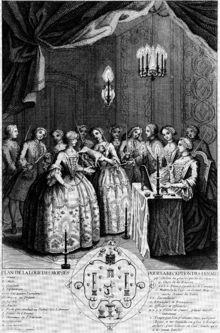Order of the Pug
The Order of the Pug (German: Mops-Orden) was a para-Masonic society founded by Roman Catholics. It is believed that it was founded in 1738 by Klemens August of Bavaria to bypass the crown's In eminenti apostolatus of 1738. The constitution of the Order of the Pug allowed women to become members, as long as they were Catholic. The Pug was chosen as a symbol of loyalty, trustworthiness and steadiness.[1]

Members called themselves Mops (the German for Pug), novices were initiated wearing a dog collar and had to scratch at the door to get in. The novices were blindfolded and led around a carpet with symbols on it nine times while the Pugs of the order barked loudly to test the steadiness of the newcomers. During the initiation, the novices also had to kiss a Pug's (porcelain) backside under its tail as an expression of total devotion. Members of the order carried a Pug medallion made of silver. In 1745, the secrets of the order were "exposed" in a book published in Amsterdam with the title L'ordre des Franc-Maçons trahi et le Secret des Mopses révélé which included the ritual and two engravings illustrating their rite.[2]
The order was banned by Göttingen University in 1748. Loge Louise des ehrwürdigen Mopsordens or "Lodge Louise of the Venerable Order of the Pug" had been formed the previous year as a student society, mainly drawn from the Hanoverian nobility. The lodge fees and their control over their members formed the excuse for the closure, and after a government investigation, the lodge documents were passed to the university authorities.[3]
While German sources state that the order was short lived,[4] they were reportedly active in Lyon as late as 1902.[5]
Bibliography
- Joachim Berger (publisher): Geheime Gesellschaft. Weimar und die deutsche Freimaurerei. Hanser, München 2002, ISBN 3-446-20255-2
- Abbé Larudan: Die zerschmetterten Freymäurer, Oder Fortsetzung des verrathenen Ordens der Freymäurer. Edition Cagliostro, Rotterdam 1984 (reproduction Frankfurt/M. 1746)
- Zirkel, Jahrgang 56, Nr. 4 concerning Wilhelmine von Bayreuth, sister of Frederick II of Prussia
References
- Masonic Trowel Mackey's Lexicon of Freemasonry, 1844, entry for "Mopses", retrieved 18 March 2013
- Google Books Gabriel Louis Calabre Pérau, L'ordre des Franc-Maçons trahi et le Secret des Mopses révélé, Amsterdam, 2910, pp 119 et seq, retrieved 18 December 2023
- Franz Stadtmüller: Geschichte des Corps Hannovera zu Göttingen, Göttingen, 1963, p10 (ref copied from German Wikipedia)
- Welpen.de Was hat der Mops mit den Freimaurern zu tun?, retrieved 17 March 2013
- Rues de Lyon Archived 7 October 2011 at the Wayback Machine Avenue de Saxe, retrieved 17 March 2013
